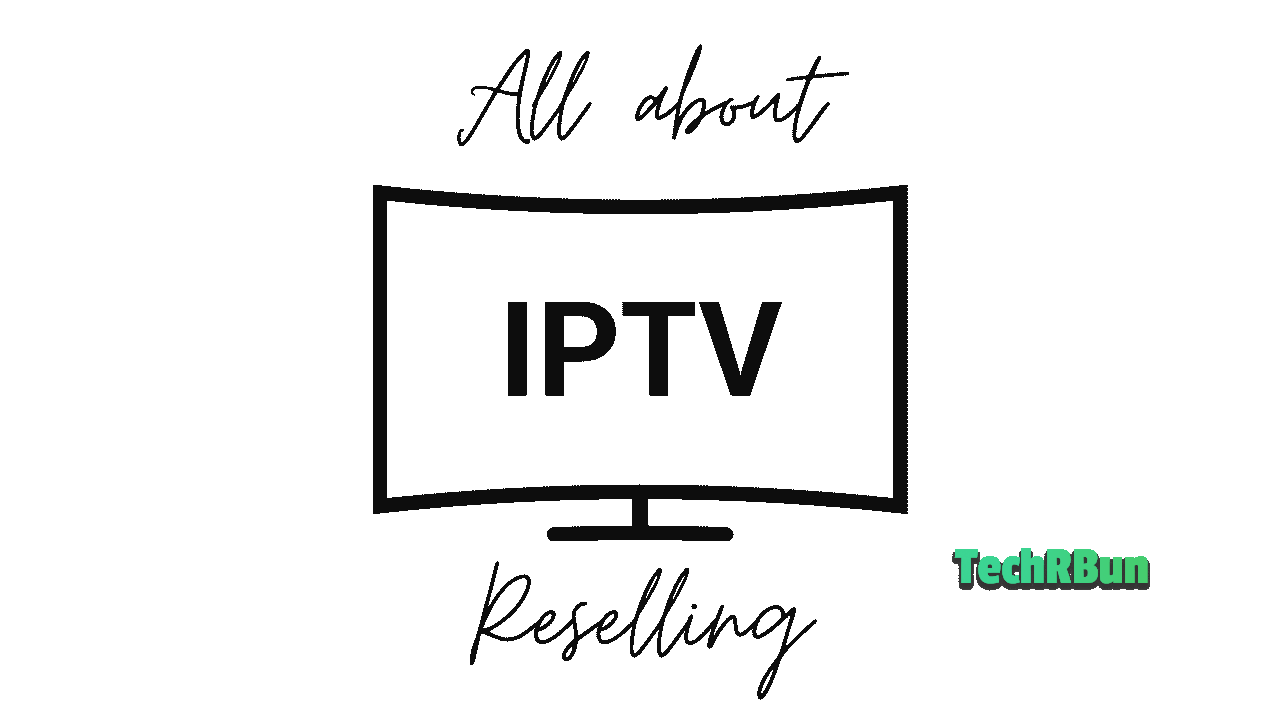In today’s digital age, the way we consume television content has undergone a dramatic transformation. Gone are the days when cable and satellite subscriptions were the only options for accessing our favorite shows and movies.
Enter IPTV, or Internet Protocol Television, which has revolutionized the way we enjoy entertainment. But what exactly is IPTV reselling, and why is it gaining such popularity? In this article, we will delve into the basics of IPTV reselling, explore its benefits for individuals and businesses, and provide a comprehensive understanding of this exciting opportunity.
IPTV reselling refers to the process of purchasing bulk IPTV subscriptions from a service provider and then reselling them to end-users for a profit. It allows entrepreneurs to become middlemen between IPTV providers and customers, leveraging their marketing skills and networks to generate revenue.

With the ever-increasing demand for IPTV services, reselling presents a lucrative business opportunity for those who are willing to explore the possibilities.
Now, let’s take a closer look at the advantages of IPTV reselling.
Firstly, it provides a low-cost entry into the television content distribution market. Rather than investing substantial capital in building an IPTV infrastructure from scratch, resellers can tap into existing services, reducing initial investment and overhead costs significantly. This affordability makes IPTV reselling an attractive option for individuals and small businesses looking to enter the industry.
Secondly, IPTV reselling offers flexible business models. Resellers can choose between different pricing plans, subscription durations, and packages to cater to a wide range of customer preferences. This flexibility allows resellers to adapt to market demands, target specific niche audiences, and differentiate themselves from competitors.
In this article, we will explore the various aspects of IPTV reselling, from understanding the technology behind it to grasping the key components of a successful reselling venture.
We will discuss the process of selecting a reliable IPTV service provider, explore effective marketing strategies to attract customers, and address common challenges faced by resellers.
So, whether you’re an aspiring entrepreneur looking for a profitable venture or a curious individual seeking to understand the inner workings of IPTV reselling, this article will provide you with the necessary knowledge to embark on this exciting journey.
Stay tuned as we dive deeper into the world of IPTV reselling, unlocking the potential it holds for both individuals and businesses. Let’s explore the limitless possibilities together and understand how IPTV reselling can shape the future of television content distribution.
Table of Contents
- 1 Understanding IPTV Basics
- 2 The Business of IPTV Reselling
- 3 Setting Up an IPTV Reselling Business
- 3.1 Step 1: Research and Planning
- 3.2 Step 2: Legal and Regulatory Considerations
- 3.3 Step 3: Partnering with Reliable IPTV Service Providers
- 3.4 Step 4: Pricing Strategies and Packaging Options
- 3.5 Step 5: Marketing and Promotion
- 3.6 Step 6: Customer Support and Retention
- 3.7 Step 7: Scaling and Adaptation
- 4 Managing and Growing an IPTV Reselling Business
- 5 Legal and Ethical Considerations in IPTV Reselling
- 6 Conclusion
Understanding IPTV Basics

IPTV, which stands for Internet Protocol Television, is a digital television distribution technology that uses the internet to deliver television content to users. Unlike traditional broadcast television, which relies on satellite or cable infrastructure, IPTV utilizes internet protocols to transmit video streams, providing viewers with a more versatile and customizable television experience.
At its core, IPTV works by converting television signals into IP packets and transmitting them over the internet. When a user requests a specific TV show or channel, the content is streamed in real-time through an IP network, allowing for on-demand access to a wide range of media. This technology enables viewers to watch their favorite programs on various devices, including smart TVs, smartphones, tablets, and computers, without being tied to a specific broadcast schedule.
One of the key advantages of IPTV is its interactive nature. Unlike traditional broadcast television, which offers limited control over programming, IPTV allows users to pause, rewind, or fast-forward through content, giving them greater flexibility and convenience. Additionally, IPTV offers an extensive library of on-demand content, including movies, TV series, and special events, providing users with a vast selection to choose from at their convenience.
IPTV also boasts superior video and audio quality compared to traditional television. With advancements in compression technologies and the use of high-speed internet connections, IPTV can deliver high-definition (HD) and even ultra-high-definition (UHD) content, ensuring a more immersive and visually appealing viewing experience. Moreover, IPTV supports various audio formats, including surround sound, enhancing the audio quality and providing users with a theater-like atmosphere in the comfort of their homes.
When it comes to IPTV services, there are several types available in the market. The most common types include:
- Live IPTV: This type of service enables users to watch live television channels as they are being broadcasted. It offers a wide range of channels, including sports, news, entertainment, and international content, giving users access to real-time programming.
- Video on Demand (VOD): VOD IPTV services allow users to select and watch specific content from a vast library of movies, TV shows, documentaries, and other media. This feature provides users with the flexibility to watch their preferred content at their own pace.
- Time-Shifted IPTV: Time-shifted IPTV services enable users to access previously broadcasted content on specific channels. Users can rewind, pause, or fast-forward through the content, offering greater control over their viewing experience.
- Catch-Up TV: Catch-Up TV IPTV services allow users to access recently aired programs or episodes that they may have missed. This feature eliminates the need to rely on traditional DVRs (Digital Video Recorders) and provides users with convenient access to their favorite shows.
- Interactive IPTV: Interactive IPTV services offer additional features and functionalities, such as interactive games, social media integration, and on-screen applications. These services enhance user engagement and provide a more interactive and immersive television experience.
In summary, IPTV is a digital television distribution technology that leverages the internet to deliver TV content to users.
With its interactive features, superior video and audio quality, and various service types, IPTV offers a more personalized and flexible television experience compared to traditional broadcast methods. As the demand for IPTV continues to grow, understanding its key characteristics and available services is essential for both users and aspiring IPTV resellers.
The Business of IPTV Reselling

IPTV reselling is a business model that involves purchasing bulk IPTV subscriptions from service providers and then reselling them to end-users for a profit. While traditional IPTV services are directly provided by service providers to consumers, IPTV reselling introduces an intermediary – the reseller – who acts as a bridge between the service provider and the customers.
There are several reasons why individuals choose to become IPTV resellers. Firstly, it presents a low-cost entry into the television content distribution market. Instead of investing substantial capital in building an IPTV infrastructure from scratch, resellers can leverage existing services and infrastructure provided by reliable IPTV service providers. This significantly reduces the initial investment and operational costs, making it an attractive option for aspiring entrepreneurs.
Secondly, IPTV reselling offers a flexible business model. Resellers have the freedom to determine their own pricing plans, subscription durations, and packages. This flexibility allows resellers to adapt to market demands, target specific niche audiences, and differentiate themselves from competitors. By offering tailored packages and catering to specific customer preferences, resellers can attract a loyal customer base and foster long-term relationships.
Starting an IPTV reselling business comes with several benefits, but it also entails certain challenges. Let’s explore both aspects:
Benefits of starting an IPTV reselling business
- Low investment: Compared to starting an IPTV service from scratch, reselling requires minimal upfront investment, as the infrastructure is provided by the service provider. This allows resellers to focus their resources on marketing and customer acquisition.
- Wide range of content: By partnering with established IPTV service providers, resellers gain access to a diverse range of content, including international channels, sports events, movies, and TV shows. This extensive content library attracts a broader customer base and enhances the value proposition for potential subscribers.
- Scalability: IPTV reselling businesses can easily scale their operations by adding more customers and subscriptions. As the customer base grows, resellers can increase their revenue streams without incurring significant additional costs.
Challenges of starting an IPTV reselling business
- Competition: The IPTV market is becoming increasingly competitive, with numerous resellers vying for customers’ attention. Resellers must employ effective marketing strategies and differentiate themselves to stand out in this crowded marketplace.
- Technical expertise: While resellers don’t need to build the IPTV infrastructure, they should have a basic understanding of the technology and be able to troubleshoot common customer issues. Providing reliable customer support is crucial for retaining customers and building a positive reputation.
- Content licensing: Resellers must ensure they have the necessary rights and licenses to distribute the content provided by the IPTV service provider. Compliance with copyright laws and licensing agreements is essential to avoid legal complications.
In terms of revenue streams and profitability, IPTV reselling offers various avenues for generating income. Resellers typically earn revenue through subscription fees, wherein customers pay a recurring fee for access to the IPTV service. The reseller’s profit margin is determined by the price at which they purchase subscriptions from the service provider and the price they set for their customers.
Additionally, resellers can explore value-added services to increase revenue. These can include offering premium packages with exclusive content, providing additional features such as DVR capabilities, or bundling IPTV subscriptions with other related services like internet or home entertainment packages.
Successful IPTV reselling businesses often employ effective strategies to attract and retain customers. They focus on targeted marketing campaigns to reach their intended audience, utilizing digital marketing channels, social media platforms, and affiliate programs. They also prioritize excellent customer service, promptly addressing inquiries, and resolving issues to ensure a positive customer experience.
For instance, a successful IPTV reselling business may leverage partnerships with influencers or bloggers in the entertainment industry to promote their services. They may also offer free trials or limited-time discounts to entice potential customers to try their IPTV service.
In conclusion, IPTV reselling is a business model that provides entrepreneurs with an opportunity to tap into the growing IPTV market. It offers advantages such as low investment, flexibility, and scalability. However, resellers should be prepared to tackle challenges such as competition and technical requirements. By adopting effective marketing strategies, understanding customer preferences, and offering value-added services, resellers can establish a profitable IPTV reselling business and carve out a successful niche in the industry.
Setting Up an IPTV Reselling Business
Setting up an IPTV reselling business requires careful planning and execution. By following these steps, you can establish a solid foundation for your venture:
Step 1: Research and Planning
- Conduct thorough market research to understand the demand for IPTV services in your target market. Identify your target audience and their preferences.
- Define your business goals, such as the number of customers you aim to acquire and the revenue targets you want to achieve.
- Create a business plan outlining your marketing strategies, pricing models, and financial projections.
Step 2: Legal and Regulatory Considerations
- Familiarize yourself with the legal and regulatory frameworks related to IPTV reselling in your jurisdiction. Ensure compliance with copyright laws, content licensing requirements, and any other relevant regulations.
- Consult with legal experts to understand the specific obligations and restrictions you need to adhere to.
Step 3: Partnering with Reliable IPTV Service Providers
- Research and identify reputable IPTV service providers that offer comprehensive channel lineups, reliable streaming quality, and customer support.
- Evaluate their technical capabilities, server infrastructure, and content library to ensure they can meet the needs of your target market.
- Consider factors such as pricing, subscription models, and available features when selecting a service provider that aligns with your business goals.
Step 4: Pricing Strategies and Packaging Options
- Determine your pricing structure by considering factors such as your costs, profit margins, and the competitive landscape. Strike a balance between affordability for customers and profitability for your business.
- Offer various subscription packages tailored to different customer segments. This can include options for different channel lineups, subscription durations, and additional features.
- Consider bundling IPTV subscriptions with other related services, such as internet packages or home entertainment solutions, to create value and attract a broader customer base.
Step 5: Marketing and Promotion
- Develop a comprehensive marketing strategy to raise awareness about your IPTV reselling business. Utilize digital marketing channels, including social media platforms, search engine optimization (SEO), and paid advertising, to reach your target audience.
- Leverage influencer partnerships, affiliate programs, and referral incentives to expand your customer reach and drive customer acquisition.
- Focus on creating compelling content that highlights the unique features and benefits of your IPTV service. This can include video tutorials, customer testimonials, and engaging social media content.
- Engage with your audience through online communities, forums, and industry-specific platforms to establish your expertise and build trust with potential customers.
Step 6: Customer Support and Retention
- Provide reliable and responsive customer support to address inquiries, technical issues, and subscription management promptly. This can be achieved through email, live chat, or dedicated support ticket systems.
- Foster long-term relationships with your customers by offering personalized assistance, loyalty programs, and periodic promotions or discounts.
- Continuously monitor customer satisfaction and gather feedback to identify areas for improvement and enhance the overall customer experience.
Step 7: Scaling and Adaptation
- Regularly assess your business performance, monitor market trends, and adapt your strategies accordingly. Stay updated with the latest IPTV technologies and industry developments to remain competitive.
- As your customer base grows, consider expanding your service offerings, exploring partnerships with content creators, or venturing into new target markets to maximize your business potential.
By following these steps and remaining dedicated to providing a high-quality IPTV service, you can establish a successful IPTV reselling business. Remember to prioritize customer satisfaction, maintain compliance with legal requirements, and continually innovate to stay ahead in this dynamic industry.
Managing and Growing an IPTV Reselling Business

Managing and growing an IPTV reselling business requires consistent effort and a focus on customer satisfaction. Here are some key aspects to consider:
Customer Support and Service Quality
- Customer support is crucial for maintaining customer satisfaction. Provide multiple channels of support, such as email, live chat, or a dedicated support ticket system, and ensure prompt and helpful responses to customer inquiries or issues.
- Regularly monitor service quality, including video and audio streaming performance, channel availability, and overall system stability. Address any technical issues promptly to minimize disruptions for your customers.
- Seek feedback from customers and use it to improve service quality. Actively listen to their suggestions and concerns, and implement necessary changes to enhance the overall user experience.
Subscription Management and Payments
- Implement a robust system for managing subscriptions, including user registrations, account creation, and subscription renewals. Streamline the process to make it user-friendly and convenient for customers to manage their subscriptions.
- Provide clear and transparent pricing information, subscription options, and payment methods. Ensure secure payment processing to instill confidence in your customers.
- Set up automated reminders for subscription renewals and offer flexible payment options, such as monthly, quarterly, or annual plans, to cater to different customer preferences.
Troubleshooting and Handling Customer Complaints
- Establish a comprehensive troubleshooting guide or knowledge base to assist customers with common IPTV issues, such as buffering, channel freezing, or audio problems. Include step-by-step instructions or video tutorials to help users resolve these issues independently.
- Actively monitor customer complaints and resolve them promptly and professionally. Maintain open lines of communication with dissatisfied customers and offer appropriate solutions or compensations, when necessary, to ensure their satisfaction.
Strategies for Expansion and Growth
- Regularly assess market trends and identify opportunities for expansion. Consider introducing new features, adding more channels, or offering specialized content packages to cater to specific customer segments.
- Invest in marketing and advertising efforts to expand your customer base. Leverage social media platforms, influencer collaborations, and content marketing to increase brand awareness and attract new customers.
- Explore partnerships and collaborations with other businesses in the entertainment industry. This can involve collaborating with content creators, local broadcasters, or even other IPTV resellers to enhance your service offerings and reach a wider audience.
Enhancing Business Offerings through Partnerships
- Partner with content creators or production studios to offer exclusive or original content to your customers. This can help differentiate your service and attract subscribers who are seeking unique and premium content.
- Collaborate with internet service providers (ISPs) or home entertainment solution providers to bundle your IPTV subscriptions with their services. This can create a value-added offering for customers and expand your distribution channels.
- Consider partnerships with complementary businesses, such as home automation providers or smart TV manufacturers, to integrate your IPTV service into their products or services. This can open up new avenues for customer acquisition and enhance the overall user experience.
Remember, building a successful IPTV reselling business requires continuous adaptation and innovation. Stay updated with emerging technologies, industry trends, and customer demands. By prioritizing customer satisfaction, maintaining service quality, and exploring strategic partnerships, you can position your business for long-term growth and success in the competitive IPTV market.
Legal and Ethical Considerations in IPTV Reselling
IPTV reselling operates within a legal and regulatory framework that governs the distribution and use of copyrighted content. It is important for IPTV resellers to understand the legal implications and ethical responsibilities associated with their business. Here are key considerations to ensure compliance and ethical practices:
Legal Implications and Copyright Concerns

- IPTV reselling involves the distribution of television content, which often includes copyrighted material. Unauthorized distribution of copyrighted content is illegal and can lead to legal consequences, including hefty fines and potential lawsuits.
- Resellers must ensure that they have the necessary licenses and agreements in place to distribute the content provided by their IPTV service provider. This involves understanding the terms and conditions of content licensing, which vary depending on the agreements with content creators, broadcasters, and distributors.
- Resellers should also be aware of local copyright laws and regulations specific to their jurisdiction. These laws outline the rights and limitations surrounding the use and distribution of copyrighted material.
Respecting Intellectual Property Rights
- Respecting intellectual property rights is crucial for maintaining a legal and ethical IPTV reselling business. This means not infringing on the copyrights of content creators, broadcasters, and other rights holders.
- Obtain proper licenses and permissions from the content owners or authorized distributors before distributing their content. This ensures that you are legally entitled to offer the content to your customers and helps protect the intellectual property rights of the creators.
- Educate your customers about the importance of respecting intellectual property rights and discourage any unauthorized sharing or redistribution of the content you provide.
Operating Within the Boundaries of the Law
- It is vital for IPTV resellers to operate within the boundaries of the law and comply with all applicable legal requirements. This includes obtaining any necessary business licenses, permits, or certifications required in your jurisdiction.
- Stay updated with changes in copyright laws and regulations to ensure ongoing compliance. Regularly review your business practices and make any necessary adjustments to align with legal requirements.
- If you have any concerns or uncertainties about specific legal aspects of your IPTV reselling business, consult with legal experts or professionals experienced in copyright law to ensure you are operating legally.
Ensuring Ethical Practices
- Ethical practices go beyond legal compliance and involve conducting business in a fair, transparent, and responsible manner. It is important to prioritize the interests of your customers and the content creators.
- Provide accurate and transparent information about your service, including subscription terms, pricing, and content availability. Avoid misleading or deceptive practices that may misrepresent the quality or nature of your IPTV service.
- Respect customer privacy by implementing robust data protection measures and adhering to applicable data privacy laws. Obtain customer consent before collecting any personal information and use it only for legitimate business purposes.
- Foster a culture of respect for intellectual property rights within your business. Educate your staff and customers about the importance of copyright compliance and discourage any activities that infringe on those rights.
By understanding and adhering to legal requirements, respecting intellectual property rights, and ensuring ethical practices, IPTV resellers can build a reputable and sustainable business.
Operating within the boundaries of the law not only mitigates legal risks but also helps protect the interests of content creators, broadcasters, and customers. Upholding ethical standards promotes trust and integrity in the IPTV reselling industry, contributing to its long-term growth and success.
Conclusion
In this article, we have explored the basics of IPTV reselling, understanding its definition, benefits, and types of services available. We delved into the intricacies of starting an IPTV reselling business, discussing the reasons why individuals choose this path, the benefits and challenges they may encounter, and the potential revenue streams.
We discussed the importance of customer support, service quality, and maintaining legal and ethical standards in IPTV reselling. Respecting intellectual property rights, operating within the boundaries of the law, and ensuring ethical practices are essential for a successful and sustainable business.
While IPTV reselling offers numerous advantages such as low investment and scalability, it also requires careful planning, market research, and continuous adaptation to stay ahead in a competitive industry. By partnering with reliable IPTV service providers, implementing effective pricing strategies, and employing robust marketing techniques, resellers can establish a profitable business.
As you consider entering the world of IPTV reselling, evaluate the market demand, research legal and regulatory requirements, and develop a comprehensive business plan. Understand the potential challenges, such as copyright concerns, technical issues, and competition, but also recognize the opportunities for growth and profitability.
If you are passionate about the entertainment industry and have an entrepreneurial mindset, IPTV reselling can provide an avenue to tap into a growing market. Explore the possibilities, assess your suitability, and embark on the journey of establishing your IPTV reselling business. With the right strategies, dedication, and adherence to legal and ethical standards, you can carve out your own success in this dynamic industry.







